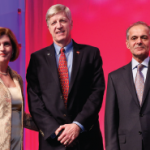As state rheumatology societies go, the Nebraska Rheumatology Society (NRS) is one of the new kids on the block. Established two years ago, the NRS hopes to involve all 27 rheumatologists across the state.
Marcus Snow, MD, a rheumatologist at the University of Nebraska Medical Center (UNMC), Omaha, says the state’s rheumatologists are spread across the state, with the majority in Lincoln and Omaha.
The NRS was launched in 2017, after Dr. Snow learned a bill to legislate biosimilars was up for debate in his state.
“I hadn’t heard of the bill and realized we needed a forum within our state where we could disseminate information about proposed legislation and play a critical role as physician advocates,” Dr. Snow says. “Since the rheumatologists in our state work in different locations and healthcare systems, communication wasn’t an easy task if it needed to be done quickly.”
A Forum Established
With the formation of the NRS, Dr. Snow says rheumatologists in Nebraska now have a pipeline where they can gain information on proposed legislation, leading to successful lobby efforts and a strong presence in the state legislature.
“We can discuss the pros and cons of proposed legislation and ensure that one of our physicians will be present at the state level to testify on our behalf and guarantee our voice is heard,” Dr. Snow says.
In speaking with his colleagues. Dr. Snow learned many of the state’s rheumatologists welcomed the idea of a state rheumatology society. After several conference calls, the society held its first organizational meeting in October 2017.
“As we worked to establish our state society, we found there were a lot of people locally, such as Sam Stinson of the Nebraska Medical Association, who were willing to help,” Dr. Snow says.
When drawing up their bylaws, Dr. Snow says he and his colleagues spoke to other physician groups, including some in other states. After reviewing the other bylaws carefully and considering key points, they used them as a guide to write the NRS’s bylaws.

Dr. Elliott
Jennifer Elliott, MD, a rheumatologist and physician-owner of Rheumatology & Osteoporosis Services, Lincoln, who serves on the NRS board of directors, says the Nebraska Medical Association has played a key role in the success of the NRS, providing guidance in the development of bylaws, securing funding sources and helping with meeting logistics.
“Our small, but mighty, state [rheumatology] society has gathered for three meetings, and we have hosted guest speakers from the ACR and other experts in the field of rheumatoid arthritis treatment and vasculitis,” Dr. Elliott says. “We have been thrilled with our membership turnout for these meetings.”
In the future, Dr. Elliott says the NRS would like to promote collaboration among other professionals in the rheumatology field.
“I’d love to see a venue where office managers, infusion nurses and other key members of a rheumatology practice could meet at the same time as the NRS to talk about best practices in their field and share information,” Dr. Elliott says. “I think we’re stronger when we all work together.”

